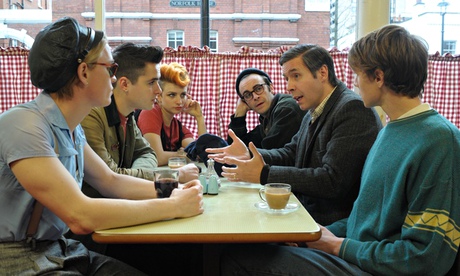
Cards on the table: having been actively involved in the banner-carrying, badge-wearing, internecine bickering of student politics in the early 80s, I am predisposed to embrace any movie that celebrates the rag-tag allegiances that sprang up across class and gender boundaries during the miners’ strike. A fondness for cute quiffs, turn-ups, and Dexys hats helps too, along with nostalgia for the time when playing Bronski Beat records really loudly could be interpreted as a political act. Add to this an enduring love of British films such as Brassed Off and Made in Dagenham, which blend hard fact with sentimental fiction, and frankly Pride had me at “Hello.” Yet even taking all the above into account, I can still say with my hand on my heart that this boisterous tale of the unlikely union between striking Welsh miners and out-and-proud gay Londoners is one of the most irresistibly uplifting films of the year – for any audience.
George MacKay is Joe, a just-turned-20 mummy’s boy on the brink of coming out who finds himself shaking a bucket for the miners in 1984 at the insistence of gobby Mark Ashton (Ben Schnetzer) and his friends at London’s Gay’s the Word bookshop. Insisting that anyone demonised by Thatcher is a comrade-in-arms, Mark launches the inelegantly named Lesbians and Gays Support the Miners (“it’s a support group, not a skiffle band”) and heads off to Onllwyn, a mining village in the Dulais valley, which seems to view “gays” and vowels with equal suspicion. Cue much La Cage aux Folles-style culture-clashing between the macho miners and metrosexual activists, mediated by theatrical luvvie Jonathan (Dominic West), who busts some outre disco moves with oddly unifying results.
While politics today may be 50 shades of grey, actor-turned-playwright Stephen Beresford’s feelgood screenplay reminds us of a time when things were more black-and-white – when the venality of Thatcher’s government asked everyone Which Side Are You On? Yet Pride not merely acknowledges but embraces the fact that the opposition were riven with divide-and-rule disagreement. When Mark demands allegiance to the miners, his Gay Pride comrades angrily recall being “beaten up every day” by the very people they are now asked to support. Despite hefty donations, many of the miners and their wives remain frostily hostile to the incomers amid growing anxieties about Aids (these were the days of Greater Manchester police chief constable James Anderton’s “human cesspool of their own making” tirades, and apocalyptic “public health” campaigns more concerned with stonemasonry than safe sex). Yet for all the factionalism, the tone here is conciliatory and celebratory; when a breakaway lesbian separatist group (all three of them) emerges within the ranks of LGSM, we laugh with them rather than at them: Beresford and director Matthew Warchus (who helmed Matilda on stage, and will succeed Kevin Spacey at the Old Vic) opt to respect and empower anyone willing to fight the good fight.
In dramatic terms, the strokes could hardly be broader. Playing to the widest possible audience, Pride employs a reassuring cast and familiar Ealing comedy tropes in fine, broad-church fashion. The soundtrack too wears its heart on its LP sleeve, blending songs of solidarity (Billy Bragg’s mighty rendition of There Is Power in a Union) with Greek chorus pop (from Shirley & Company to Frankie) culminating in a Pits and Perverts benefit at the Electric Ballroom. Meanwhile, down in the valleys, the miners’ wives stand and sing Bread and Roses, leaving nary a dry eye in the house.
Holding it all together is a strong thread of Full Monty humour, Beresford taking a leaf out of Simon Beaufoy’s book and giving all the best lines to the working-class women whose indomitable spirit equals and outdoes that of their embattled menfolk. Imelda Staunton is magnificent as Hefina, making the most of her heavily trailed declaration that “We’re just off to Swansea now for a massive les-off!” and leading her drunken cohort through the gay bars of London with game aplomb. Nor does Warchus shy away from the sex which so often dare not speak its name in mainstream movies – what snogging there is knows no gender boundaries, and a sprinkling of dildos and unzipped centrefolds (“God, that takes me back!”) ensures that this pays more than coy lip-service to its equal-ops mantra. It’s significant, too, that Joe’s first kiss coincides with the climax of a rousing speech about solidarity, ensuring that the personal and political go hand-in-hand throughout.
And there’s so much more to love: Paddy Considine as enlightened striker Dai, arguing the case for unity; Bill Nighy, beautifully understated as old-school stalwart Cliff with his not-so-hidden history; Liz White reminding us why we all fell for her in Life on Mars. OK, so it may not have the toughness of Brassed Off or the fleet-footedness of Billy Elliot, but what it does have is spine-tingling charm by the bucket-load. I laughed, I cried, and frankly I would have raised a clenched fist were both hands not already occupied wiping away the bittersweet tears of joy.

